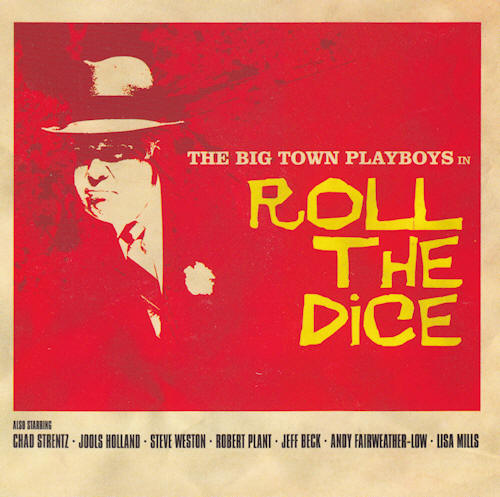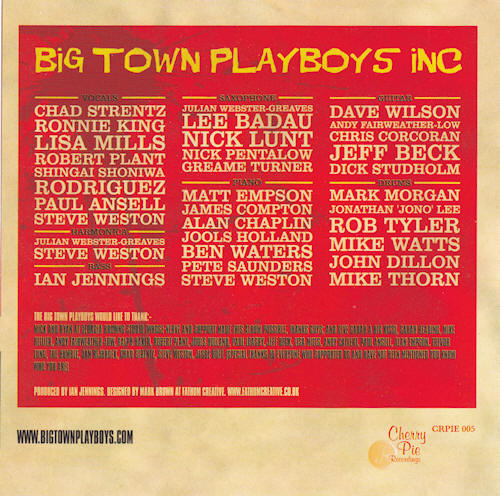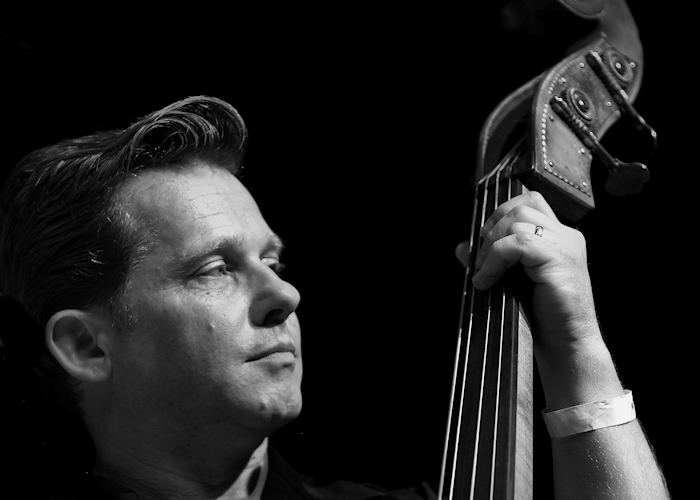
Painting © 2004 Loz
Arkle
Website
© Copyright 2000-2011 Alan White - All
Rights Reserved
Site optimised for Microsoft Internet Explorer
Early Blues Interview
|
|
"Ian was a
co-founding member of The Big Town Playboys who now works as a freelance
double bassist/ bass guitarist with loads of different bands .... his
CV includes live work and record sessions with
Carl Perkins,
Jeff Beck, Robert Plant, Billy Lee Riley, Champion Jack Dupree, Jools
Holland, Lowell Fulsom, Roscoe Gordon, Andy Fairweather Low, Tom Jones,
Willie Littlefield, Van Morrison, Lisa Mills, Mick Fleetwood, Paul Rogers, Buffalo Squeeze, Chrissie Hynde, Sophisticated Savage, Jimmy Page, Scotty Moore, Lulu, DJ Fontana, Ronnie Wood, Jimmy Copley, Eric Clapton, and Mark Knopfler .... thatís enough for now as the Duke of Edinburgh told him "it's a red card to name drop". - Ian Jennings on Myspace
I caught up with Ian at the Great British R&B Festival, Colne after his three sets with Giles Robson & The Dirty Aces, Lisa Mills and the Mud Morganfield Band: Alan: What are your first musical memories growing up in Worcestershire? Ian: I used to play my mom and dad's old 45's - that was great, and I also remember in the mid 70s I suppose, being at a fairground walking round and hearing the music of the fairground - playing all that chart stuff, disco sort of stuff, then all of a sudden somebody put 'The Wanderer' by Dion onto the sound system in the fairground and I just remember walking round saying "What was that?" - it was that groove, the opening and the great tenor solo, and I was never the same after that. I went to school with Mike Sanchez and a gang of other guys who were like minded people. We were into white rock 'n' roll really; starts with Elvis then you get into Jerry Lee Lewis, then you start looking at Chuck Berry and Little Richard, then dig a little bit deeper you get into the southern rockabilly sort of scene of the late 70s. We got a trio together me and Mike and a local drummer and gigged around for four or five years with a little bit of recording, nothing over the top, but we had a great time anyway - it was quite a wild trio really.
Alan: Where exactly were you born in Worcestershire? Ian: A little village called Low Habberley, which is about 5 miles outside Kidderminster. Alan: I was born in Upton upon Severn, Worcestershire. Ian: Yes, I can tell by your accent there. I was over there the other day, my dad's 80th birthday dinner, we were by Upton - nice place. Alan: Did you come from a musical family - is there a long musical heritage? Ian: Not really no, I've got an Aunty that in the 60s, she was the closest thing to a beatnik that my family had got. She played acoustic guitar and travel around France wearing black clothes, hitchhiking stuff like that, and people shook their heads when talking about her. She gave me a book of chords for guitar which were about the early songs Elvis Presley played. Since then though my dad sings in the local Kidderminster choir; they do more gigs than I do and travel all over the world.
Ian: Yes, I think I did. I was probably 14 or 15 and I got a guitar for £15 from a friend. It was just a piece of junk really. He showed me the idea of doing Bar chords. All the other guys we knew were playing open cowboy chords on acoustic guitars and because I was the only one who knew how to do Chuck Berry chords, that meant I was allowed into the band then and that was the start of it really. They didn't understand about playing C chords up the neck. Alan: What kind of material were you playing in the early days and who were your heroes at that time? Ian: Usually the white guys it wouldn't be until about five years later when we met Andy Sylvester and Ricky Cool that they introduced us to the really rare black albums which I just love now. All black stuff would be Little Richard, Chuck Berry, Bo Diddley. I love Bo Diddley, I saw him when I was about 17 I suppose in Birmingham, one of the few people I have asked for an autograph. I saw BB King when I was quite young as well with that big brass band, fantastic, just knocked out by the rhythm section in at band. He always had really good drummers. I saw the Stray Cats about that time and before the Stray Cats the rock 'n' roll bands were a little bit tame I suppose. They didn't have that much attitude and the Stray Cats came in and the guys that liked the old rock 'n' roll bands, they thought the stray Cats were a punk band. I remember I bought one of the Stray Cats singles and I took it to a rock 'n' roll DJ in Birmingham at one of the Sunday lunchtime sessions. I went up to the DJ, an older guy, and asked him if he would play the single I had just bought and he looked at it and he said "I'm not playing that" and he threw it into the middle of the dance floor and I had to walk back and pick it up. I realised then that those older guys were a different sort of era; they knew their music really well but they wouldn't accept the hooligan element of the rock 'n' roll spirit. Alan: In 1984 you co-founded The Big Town Playboys band; tell me about the band, how it started, the style and influences? Ian: Me and Mike Sanchez were in a trio called The Rockets, a rockabilly trio, and Andy Sylvester, the original bass player from Chicken Shack, and Ricky Cool came to see us play. Now Ricky Cool was actually a teacher at Bewdley High School and he taught me and Mike woodwork and technical drawing, not music. But we all knew he was a musician and he got a break, he was on television and he quit teaching and all the kids went "Yeah, great, live the dream". That was actually something that me and Mike took on board, you can actually do this. So then when Ricky Cool and Andy Sylvester approached us, The Rockets had been gigging awhile but really wasn't going to go much further, so we jumped at the chance of working with Andy and Ricky and just started rehearsing in Bewdley. Then we got a local residency played every Wednesday until we got a set together and took it down to London because they had connections with venues.
Alan: You're known as the 'band's band' I believe there have been many guest appearances on albums as well as on stage and you have backed many big names. Ian: 'Namedropping' time! Well one of the first people that the Playboys backed was Robert Plant. I've known him since I was probably 17 or 18. When The Rockets rehearsed in the top room of a pub in Bewdley, he would be downstairs having his Sunday dinner and he came up with his mate and said "What's all this flipping noise?" We didn't know who he was, we were just like kids basically, we haven't much idea about Led Zeppelin. When we played locally at little pubs and bars, sometimes he'd turn up with his family, it was great, I remember we ended up playing at his house at the party on New Year's Eve a few years ago. Robert had already done the Honeydrippers thing but he wanted to do it with a UK-based band, so he was asked to do a charity concert at the NEC for the Birmingham Children's Hospital and he asked the Playboys to do that, So we did Norwich, University of East Anglia, and Leeds University and then we did the NEC Birmingham after that. I've just been sent a bootleg copy of the concert at the NEC and it's great - I look really young! Alan: I've listed here all the people you've worked with: Carl Perkins, Jeff Beck, Robert Plant, Jools Holland, Champion Jack Dupree, Lowell Fulsom, Andy Fairweather Low, Tom Jones, Willie Littlefield, Van Morrison, Lisa Mills, Mick Fleetwood, Paul Rogers, Chrissie Hynde, Jimmy Page, Lulu, Ronnie Wood, Jimmy Copley, Eric Clapton, Mark Knopfler, how about Eric Clapton?
Alan: We could be here all day namedropping, that list is really amazing, but let's move on. You mentioned one film you appeared in, but you also appeared in Martin Scorsese's music documentary 'Red, White and Blues'; tell me how that came about? Ian: When they do documentaries, they have a roster of stars that are going to be the soloists or singers, so they had Van Morrison, Jeff Beck, Tom Jones, Lulu, and John Cleary was the piano player. I got a phone call from Jeff Beck's manager who I'd known for a long time, and Jeff's always been a really good friend of Playboys. They had asked Jeff to suggest a rhythm section for this project and he put my name down for the bass part. I'd also worked with Van Morrison before that and he was also a good friend of the band. He had put my name down as well, so there were two of the people that the producer listens to had put my name down, so that's how I got involved. With about a week's notice nobody knew what we were going to play. It was an interesting couple of days. I think that was done in the Beatles Room at Abbey Road. During the filming of it, Paul McCartney was in the studio opposite and he came over. We were set up in the round on the studio floor with studio lights all round us, so we couldn't see out of the circle because you have all the lights coming down, and there's a stairway that goes up to the control booth with a window on the wall, like a really old-fashioned studio set up. We hear this voice going "What are you doing in my studio?" Paul comes down the stairs and just said hello to everybody and then says "Let's try a song". He did a version of 'Tryin' To Get To You' and they filmed it, but it didn't make the film unfortunately. It was great fun anyway. I think the best thing about that film is the element of fun that comes over that we were having. There's lots of old rock 'n' roll stories coming out, because these guys have known each other since way back and they were all talking about "Do remember so-and-so do"; "Remember that time when..." there was a lot of that going on.
Ian: That's what it's all about really - having fun. Alan: Who have been your main influences? Ian: For bass playing, well the first people I listened to would be the white guys like Bill Black and a guy called James Kirkland who played on all the Ricky Nelson sessions, a brilliant double bass player in the rockabilly style. Then I was listening to Willie Dixon, Big Crawford, Ransom Knowlings. I think that's where I differed from a lot of the guys who were straight rockabilly guys. I was listening to the Chicago stuff, I love Willie Dixon's style, that's the man. You see a film of him and go "Right, that's what I want to be doing". Then I'd gone further back into the jazz guys like Ray Brown, Oscar Pettiford, Pops Foster even, with Louis Armstrong's band, Wellman Braud, all of the jazz guys. Then you go the other way into the 60s, once I discovered James Jamerson, the Motown bass player, I think it was Dave Bronze who told be to check out James Jamerson, because he was a double bass player first, then went on to Precision so his lines are very organic baselines and they grew so well. That really did help me to expand what I wanted to do. Then you get Duck Dunn and I recently started getting into Carol Kaye's bass playing, an LA session girl, a fantastic player. George Porter Jr. from The Meters because that's all about the groove. The baselines aren't particularly hard to learn and get together, but he never plays a note out of groove with the way he works with Zig the drummer, he's just fantastic! That's a lesson for everybody who wants to play drums or bass or music generally, they should listen to The Meters. Alan: You now also play in The Dirty Aces with Giles Robson, Mike Hellier and Filip Kozlowski; how did that come about? Ian: I'd worked with Mike Hellier with the singer Derrin Nauendorf, I depped for his bass player. Mike said I've got this idea, and Giles Robson wants to put this band together, and they need a bass player. So I said okay, well, I'll come down and do some rehearsals and see if what I do is what they want, because it's more about that than the other way round, I like the guys as well. Giles and Filip have been working together for a while. They had got some songs already and I basically came on board and did the Mud Morganfield tours, and from that, when Giles wanted to get his own project moving along a bit more, he asked me to come and play bass.
Ian: It's a great gig, Lisa's gig. I don't look at gigs in the competitive way like 'this is a better gig than another gig'. If you look at The Dirty Aces, their songs are very set piece music and there's an art in that, but Lisa's gig is totally 'chalk and cheese', it's all improvisation; she will drop some songs in to the set that I've never played before to see if she can catch me out. We just take the Mickey out of each other. She's great. I've probably known her about 10 years now. We met during the recording of The Playboys 'Roll The Dice' album. I was recording is as the anniversary album for The Playboys and I'd ask Robert Plant and Jeff Beck to come and play and Andy Fairweather Low and Jools Holland. I was listening to the playbacks thinking overall it's great, but there's one thing The Playboys have never done was have a female vocalist, so I asked a friend and he said "I've got somebody might want to listen to" and he sent me a recording of Lisa and I went "Wow, this is incredible, when can she come to the studio?" We were recording in North London, and he said "The only thing is, she's in Alabama, and I went "Oh right well, do you know anybody else?", and he went "Well let me give her a call and see what she thinks". And he got in touch with her and she said she wanted to come over and do it. And I said "Wow great, fantastic". So she flew over, she was jetlagged, and we went into the studio and we did three songs. We did Charlie Rich's 'Merry Way', Ruth Brown's 'Sweet Baby Of Mine', and then I had been trying to get The Playboys to do a Billie holiday song, which would have been a first, because we'd never touched any full-blown jazz, and they skirted around the idea of not playing it, as only musicians can! So I just played Lisa the Billie Holiday version of 'Come To Love' and she said "Oh yeah I like this, this is okay, we can do this". And we were just messing around, I was trying to teach the sequence, she didn't really know the lyrics that well and I stood next to her in the studio with a double bass and she sang it and the engineer just recorded it. I went back in there and went "Wow, that's definitely got atmosphere on that with the two of us". That's when the idea of working as a duo first came through.
Ian: Lisa came back to the UK to do her own album and I said "Well you were good enough to come and do The Playboys album so if you need some bass just tell me, so I did her album in Birmingham. Then for her next album I went to the States to help her get together the production side and then when we did her last one 'Tempered In Fire' album, that was in Kent at Mike Thorne's studio. Alan: You had some snow there I believe. Ian: Hhmmm, yes, yes, we seemed to get that. That was awful, the poor drummer came in from New Orleans, poor devil, he said he was in Kent for about maybe 2 1/2 weeks, and he said he never took his thermals off the whole time. It was so hot in New Orleans then you come to the middle of Kent and he'd never seen anything like it. I haven't seen anything like it either and I live here. Alan: Are there any particular songs that you play that have special meaning to you? Ian: Yes, when you relate to the lyrics, 'Come To Love', there something going on there, also there are some songs that Lisa's written or performs that have got quite deep meaning to them. I can see people in the audience relating to it and the thing with Lisa is she always talks to the audience and tells them why she wants to do the song. So people genuinely listen to what she says and I go "Oh right, I remember when I was in that situation". She's got a real good ability to connect with people, and it's very honest as well, there's no showbiz thing going on there and I love that, it's so honest. Alan: Looking back on your career so far, what are your fondest memories?
Ian: Funny stories really. Let's think of a good
one. A mad story is the first time I did a Van Morrison session; I was
living in North London and the tenor sax player Leo Green who'd been in
The Playboys and left, had got the job with Van Morrison's band. He rang
me up at 7:30 in the morning one day and said "Morning, all right mate,
do you want to do a session?" He was a really bouncy tenor player, and I
go "Okay yeah, call me back when it's a bit closer". And he said "No
it's today", and I went "Right, okay". I thought it would be in central
London, so I thought I'd just doze off again, and I said "Where is it
then?", and he said "It's outside Bath at Van Morrison's studio. And I
went "Oh, right, okay I can do it, what time are we starting?" And he
said "Lunchtime". So I got down to Paddington Station with a double bass
just in time to catch the train. Leo was already on the train, and they
were trying to leave as the train was late, and I'm running up the
platform with a double bass on my back and all commuters are looking out
of the window scowling at me and I had but the bass in the guards van.
So we go straight down to Bath and I was trying to get out of Leo what
the session was about and he said "Oh I don't know mate, nobody tells me
anything". But I think he knew anyway. I got to the studio just a little
bit late, because we'd travelled down from London and I walked into the
studio onto the studio floor and there is Van Morrison sitting in his
chair there, with a microphone in front of him so he's going to record
the vocals at the same time as everything else, and I go "Wow that's Van
The other one is with Jeff Beck, he's always loved The Playboys and we did the Gene Vincent album, that was great. He offered me some sessions after that, all different sorts of music, bass guitar sessions as well. He got the chance to do a session with Scotty Moore and D.J. Fontana, Elvis's original guys, and they were setting this gig up. The session was going to be at Ronnie Wood's studio at his house in Ireland. Jeff had said to them "I'll come and do it but you've got to get a rock 'n' roll double bass player", and they said "OK, do you know of anyone?", so Jeff went "Yes, actually". He got me out there and we had a great weekend. Ronnie was the bartender, so yes, you could imagine it was great really, lots of Guinness and Irish whiskey. I got some good rock 'n' roll stories of D.J., touring with Elvis really early on. After the session, I was the last one to go to the airport, I was going to get an early flight the next morning. Everyone had gone, there was just me and Ronnie, so we just stood at the bar playing these videos on his little television watching all rhythm and blues videos, getting slowly, really, really drunk. And we just stayed up, there was no point in going to sleep. We just talked about playing in bands, he's great. it was great fun.
Alan: Thank you very much for those stories and
for your time Ian.
http://www.myspace.com/ianjenningsbass
Check out Ian Jennings with Lisa Mills at the Great British R&B Festival 2011, Colne Check out Ian Jennings with The Dirty Aces at the Great British R&B Festival 2011, Colne Check out the Interview with Lisa Mills _________________________________________________________________________
Return to
Blues Interviews List |








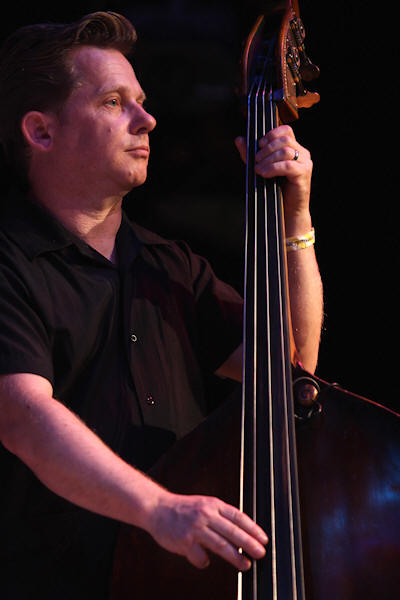
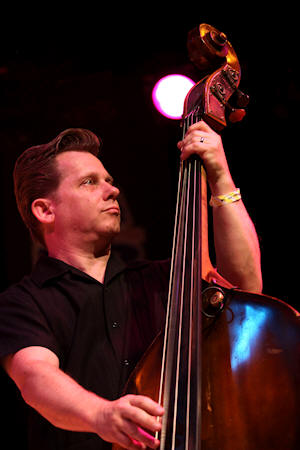 Alan:
Did you always want to become a musician?
Alan:
Did you always want to become a musician? 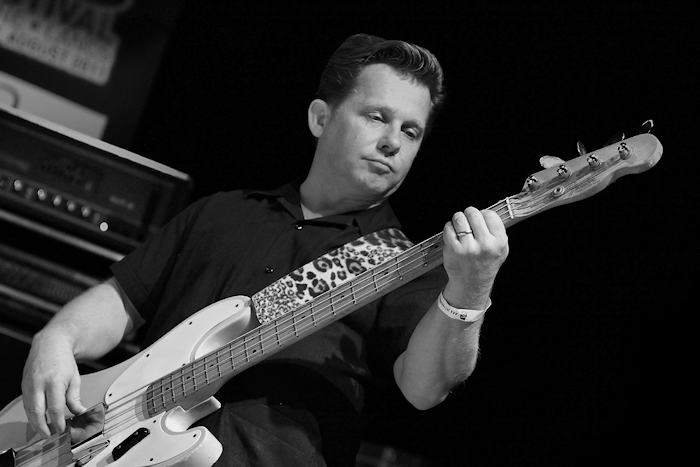
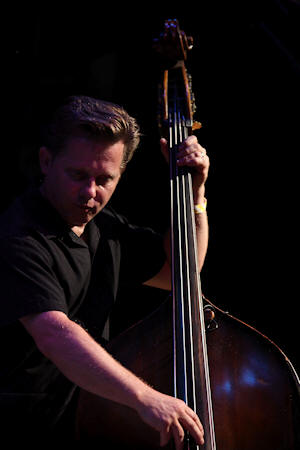 Ian:
Yeah, that's a good story. That was fairly early on as well. We had
already done the NEC concert with Robert. We met Gary Brooker, the
singer from Procol Harum, who used to come and see us when we played in
London, and he invited us to do the support for his Christmas shows in
his local village in Surrey. He puts a band together of his friends and
he invited us to do the support for it. It was in a tiny village hall.
We had a sax player from London working with us and we told him we'd got
this gig just before Christmas and it's in this village hall and we were
all excited about it as we didn't know really what was going to happen.
But the sax player said "I'm not going down to this little village hall,
I'll do a gig in town instead". So we went down there as a four piece
with no brass. We didn't know who was in Gary's band. We walked in the
village hall and they were sound checking, and there's Andy Fairweather
Low, Eric Clapton, Dave Bronze playing bass, Henry Spinetti on drums,
Gary, and Frank Mead playing tenor as well. Our guitarist Andy Sylvester
went "Oh my God". He was nervous as well because we didn't have a sax
player; Mike had played piano solos, but it was basically down to Andy
to cover the solos, and he did a great job. After the show Eric invited
us to a recording session for a film called the 'The Colour of Money',
the follow-up to the Hustler with Paul Newman and Tom Cruise in it. So
we did a Muddy Waters track funny enough and that went really well with
Tom Dowd producing it at Air Studios. After that, Eric said "What are
you doing in January/", this was just before Christmas when all this is
going on, and we said "What do you have in mind?" He said "Well I'm
touring Europe for six weeks, can you do the support?" So we said "Ah,
I think so!". So we started in Manchester, then the Albert Hall, London
and finished in Florence, Italy. That was a great experience. As it
happens, I recently did a gig for Paul Jones at the
Cranleigh
Arts Centre,
with Eric as one of the guests. At the end of the night he comes over
and says "I haven't seen you for a while". And I said "It's great to see
you again, Eric". And he asked me about Andy Sylvester, saying "How is
Andy doing, is he still playing?", so he remembered all of that, which
was great really.
Ian:
Yeah, that's a good story. That was fairly early on as well. We had
already done the NEC concert with Robert. We met Gary Brooker, the
singer from Procol Harum, who used to come and see us when we played in
London, and he invited us to do the support for his Christmas shows in
his local village in Surrey. He puts a band together of his friends and
he invited us to do the support for it. It was in a tiny village hall.
We had a sax player from London working with us and we told him we'd got
this gig just before Christmas and it's in this village hall and we were
all excited about it as we didn't know really what was going to happen.
But the sax player said "I'm not going down to this little village hall,
I'll do a gig in town instead". So we went down there as a four piece
with no brass. We didn't know who was in Gary's band. We walked in the
village hall and they were sound checking, and there's Andy Fairweather
Low, Eric Clapton, Dave Bronze playing bass, Henry Spinetti on drums,
Gary, and Frank Mead playing tenor as well. Our guitarist Andy Sylvester
went "Oh my God". He was nervous as well because we didn't have a sax
player; Mike had played piano solos, but it was basically down to Andy
to cover the solos, and he did a great job. After the show Eric invited
us to a recording session for a film called the 'The Colour of Money',
the follow-up to the Hustler with Paul Newman and Tom Cruise in it. So
we did a Muddy Waters track funny enough and that went really well with
Tom Dowd producing it at Air Studios. After that, Eric said "What are
you doing in January/", this was just before Christmas when all this is
going on, and we said "What do you have in mind?" He said "Well I'm
touring Europe for six weeks, can you do the support?" So we said "Ah,
I think so!". So we started in Manchester, then the Albert Hall, London
and finished in Florence, Italy. That was a great experience. As it
happens, I recently did a gig for Paul Jones at the
Cranleigh
Arts Centre,
with Eric as one of the guests. At the end of the night he comes over
and says "I haven't seen you for a while". And I said "It's great to see
you again, Eric". And he asked me about Andy Sylvester, saying "How is
Andy doing, is he still playing?", so he remembered all of that, which
was great really. 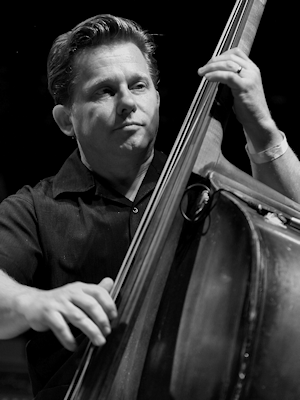 Alan:
It's lovely to hear all the banter.
Alan:
It's lovely to hear all the banter. 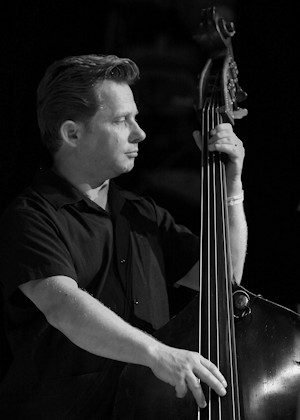 Alan:
For some years you have performed with Lisa Mills and co-produced
several of her albums: and I quote: 'Mills and Jennings - a musical
force to be reckoned with'; how would you describe the musical
chemistry there?
Alan:
For some years you have performed with Lisa Mills and co-produced
several of her albums: and I quote: 'Mills and Jennings - a musical
force to be reckoned with'; how would you describe the musical
chemistry there? 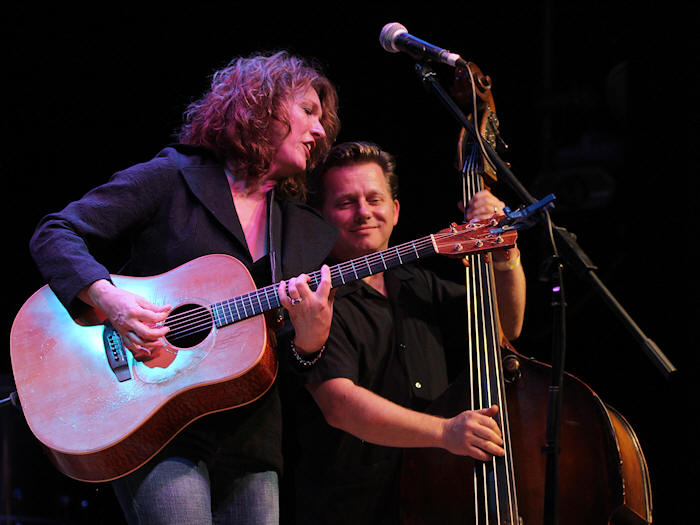
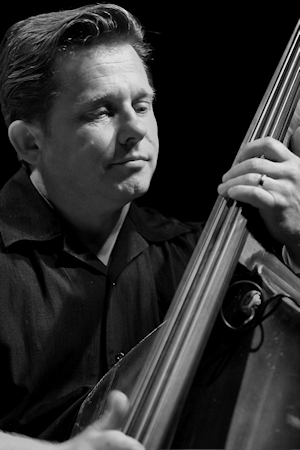 Morrison".
He's looking at me, he doesn't really know me at this point. Then I
looked round the room and there's a bunch of musicians I didn't
recognise, they were all American musicians, and then I looked over into
a corner and there's Carl Perkins, sitting with his Les Paul tuning up.
And I go "Oh my God, there's Carl Perkins". I used to listen to his
records when I was 14 or 15. There'd already recorded something and they
wanted to put rockabilly double bass on it, so that's why I got the
call. I had to drop the double bass onto the track they had already
recorded. So I had to play it with all of them stood there quietly, arms
folded, watching me, wondering if I can play, thinking 'who is this
London kid?' I had got the earphones on so I don't know if they could
hear their original track while I was putting the bass on it. So I stood
there slapping the living daylights out of the bass to a version of
"Honey Don't", and then we all filed upstairs three flights into the
control room for the playback and they were all stood around listening
to it and nobody said anything at all. And I thought "I'd better go back
to the train station, at least I've met Carl Perkins". And they all
turned round and went "That's great, we are going to do some more now.
We're really glad you came down". They were really friendly with me. It
was great. It was such a shock when I walked in there because Leo
wouldn't tell me what was happening, God bless him.
Morrison".
He's looking at me, he doesn't really know me at this point. Then I
looked round the room and there's a bunch of musicians I didn't
recognise, they were all American musicians, and then I looked over into
a corner and there's Carl Perkins, sitting with his Les Paul tuning up.
And I go "Oh my God, there's Carl Perkins". I used to listen to his
records when I was 14 or 15. There'd already recorded something and they
wanted to put rockabilly double bass on it, so that's why I got the
call. I had to drop the double bass onto the track they had already
recorded. So I had to play it with all of them stood there quietly, arms
folded, watching me, wondering if I can play, thinking 'who is this
London kid?' I had got the earphones on so I don't know if they could
hear their original track while I was putting the bass on it. So I stood
there slapping the living daylights out of the bass to a version of
"Honey Don't", and then we all filed upstairs three flights into the
control room for the playback and they were all stood around listening
to it and nobody said anything at all. And I thought "I'd better go back
to the train station, at least I've met Carl Perkins". And they all
turned round and went "That's great, we are going to do some more now.
We're really glad you came down". They were really friendly with me. It
was great. It was such a shock when I walked in there because Leo
wouldn't tell me what was happening, God bless him. 